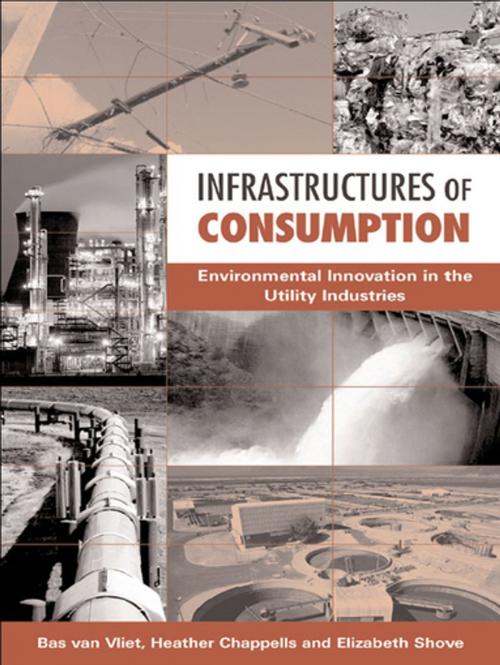Infrastructures of Consumption
Environmental Innovation in the Utility Industries
Nonfiction, Social & Cultural Studies, Political Science, Politics, Regional Planning, Art & Architecture, Architecture, Landscape, Planning| Author: | Elizabeth Shove, Heather Chappells, Bas Van Vliet | ISBN: | 9781136563010 |
| Publisher: | Taylor and Francis | Publication: | March 29, 2012 |
| Imprint: | Routledge | Language: | English |
| Author: | Elizabeth Shove, Heather Chappells, Bas Van Vliet |
| ISBN: | 9781136563010 |
| Publisher: | Taylor and Francis |
| Publication: | March 29, 2012 |
| Imprint: | Routledge |
| Language: | English |
For many years, a uniform and uncontested picture of utility system organization has endured across Europe. Provider and consumer roles have been largely taken for granted, and consumers have had little choice but to use the infrastructure of the only network provider available. Recent transformations have challenged this model. This book examines the ongoing environmental restructuring of consumption and provision in energy, water and waste systems. In accounting for the distinctive environmental qualities, technical features, and institutional dynamics of utility systems this book challenges contemporary conceptualizations of consumers as the autonomous drivers of environmental change. Instead, utilities and users are positioned as the 'co-managers' of utility systems, and processes of environmental innovation are seen to depend on the systemic restructuring of demand.
For many years, a uniform and uncontested picture of utility system organization has endured across Europe. Provider and consumer roles have been largely taken for granted, and consumers have had little choice but to use the infrastructure of the only network provider available. Recent transformations have challenged this model. This book examines the ongoing environmental restructuring of consumption and provision in energy, water and waste systems. In accounting for the distinctive environmental qualities, technical features, and institutional dynamics of utility systems this book challenges contemporary conceptualizations of consumers as the autonomous drivers of environmental change. Instead, utilities and users are positioned as the 'co-managers' of utility systems, and processes of environmental innovation are seen to depend on the systemic restructuring of demand.















